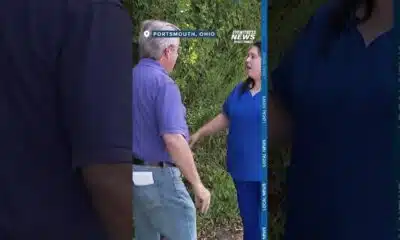News from the South - Tennessee News Feed
Stockard on the Stump: Williamson Republican vote could foreshadow 2026 state Senate race
Stockard on the Stump: Williamson Republican vote could foreshadow 2026 state Senate race
by Sam Stockard, Tennessee Lookout
March 7, 2025
In a potential preview of Williamson County’s 2026 state Senate race, “Elevate 2025” candidates eased past “Williamson County Conservatives” this week in a battle to run the Republican Party from the right.
Though they weren’t on the ballot, the contest pitted Gary Humble of Tennessee Stands against Senate Majority Leader Jack Johnson, whose candidate, Brian Clifford, fell short of the Humble group’s Steve Hickey for the party chairmanship despite heavy spending.
Williamson County residents Gov. Bill Lee and his wife were among those sitting next to Johnson, who has spent the last two years burnishing his conservative bona fides after a close contest with Humble.
The atmosphere at the Franklin Marriott Cool Springs, an appropriate setting for wealth, was described as tense as Hickey captured 796 votes to Clifford’s 751. The rest of the candidate slate proved to be a replay of 2023, setting up a possible race of Johnson vs. Humble as the Senate leader seeks re-election and the post of Senate speaker, which would make him lieutenant governor and one of the state’s most powerful politicians.
Stockard on the Stump: Humble backer files election complaint against Leader Johnson
Humble, who was ill and couldn’t attend the event, said he was “blown away” by the turnout which brought more than 1,500 votes for the chairmanship.
Opponents cast his group as backers of a Republican Party caucus, instead of a primary, something they apparently broached but that he denied. Humble said they’re more interested in closing Republican primaries statewide to keep Democrats from watering down outcomes. A bill by Republican Rep. Chris Todd of Jackson would do the trick.
The win for “Elevate 2025” marks a continuation from the last two years and sounds hauntingly similar to Project 2025, the national movement to reshape the federal government and give the president more power.
Humble wouldn’t say whether the group’s win gives him a victory over Johnson, though he acknowledged some people might categorize it that way. “That’s not what we were trying to accomplish here,” he said.
Johnson, though, spearheaded the Williamson County Conservatives PAC and asked the first few donors to give money in an effort to remove the Williamson County Republican Party board, according to Humble.
“It’s sad that Jack stole all those people’s money and pissed it down the drain,” Humble said.
Nashville businessman Baxter Lee gave $5,000 to the group in December 2024, and former congressional candidate Kurt Winstead kicked in $1,000 in January. The rest of the financials haven’t been filed.
State Rep. Todd Warner, a Chapel Hill Republican whose district includes part of Williamson, said it was clear Johnson was backing the Williamson County Conservatives.
“It was very interesting to see the governor and the first lady there … in Williamson County,” Warner said.
Republican Rep. Jake McCalmon of Franklin called the outcome “tremendous” but said he would never support caucuses to select party candidates. He said he tried to stay out of the chairman race.
Johnson acknowledged he voted for Clifford, director of outdoor recreation for the Tennessee Department of Economic and Community Development, because he has “grave concerns” about moving to a caucus selection for local races. (Oddly enough, an effort to require primaries in local elections fell flat last year.)
“I’m just happy we set a new record for a county party convention. It was a huge turnout, and it was great,” Johnson said.
The Senate leader scoffed at the notion he’s concerned that the outcome could be seen as a victory for Humble over him, though he is starting to run for another four years already. Humble isn’t willing to commit to a state Senate campaign just yet.
But you can feel a collision coming, one way or another.
Crowded house
Opponents of the bill allowing Tennessee school districts to turn away immigrant students without legal documentation packed the hallway outside the Senate’s main meeting room Wednesday after the Education Committee approved the bill 5-4. Three Republicans voted against the bill.
It was the biggest and loudest crowd in memory at the Cordell Hull Building as tiny children with parents and screaming teens vented their frustration with lawmakers.
Amid the claustrophobia, a moment of clarity arose: Tennessee is preparing to block immigrant children from going to K-12 public schools (because of the expense?) but pay for kids to go to private schools, including those already enrolled.
Is this a conundrum? Or is it a hypocritical hypothetical? Maybe it’s both.
Either way, this was far from one of Tennessee’s shining moments.
Republican Sen. Ferrell Haile of Gallatin was among the four who voted against the measure. He said Thursday he didn’t believe the state should punish children for the mistakes of their parents or the government’s poor immigration policies.
The bill by Sen. Bo Watson, a Hixson Republican who chairs the finance committee, and House Majority Leader William Lamberth of Portland, puts the onus on school districts to determine whether they’ll require kids to show documentation before allowing them into classrooms.
They make no bones about wanting a legal case that will go to the U.S. Supreme Court and overturn Plyler v. Doe, the 1982 decision requiring public schools to take all children regardless of immigration status.
So gear up for another legal battle.
On the semi-bright side, now that Attorney General Jonathan Skrmetti doesn’t have to spend resources fighting President Joe Biden’s policies, he can turn that team of attorneys toward defending President Donald Trump’s Tennessee policies.
It could be a wash.
Just above “rock bottom”
The House Public Service Subcommittee this week killed Rep. Bob Freeman’s bill that would have required lobbyists to identify each bill and legislature measure they’re being paid to oppose or support.
Freeman, a Nashville Democrat, said afterward it’s “disappointing” that lobbyists and special interest groups have more power than the public or lawmakers.
“In Tennessee, I believe we have an uneven advantage for lobbyists,” Freeman said. That’s mainly because lawmakers have little, if any, staff to research bills.
Lawmakers rely on lobbyists to provide them with information, but sometimes they take advantage of that and hide the bill’s benefactor, he said.
“I think the people of Tennessee should know who is paying people to fight for bills and to propose bills and fight to have them passed,” Freeman said.
Lobbyists are required to disclose whom they’re working for but not where they stand on those matters. Freeman rejects the notion that disclosing that type of information would be too difficult.
I think the people of Tennessee should know who is paying people to fight for bills and to propose bills and fight to have them passed.
– Rep. Bob Freeman, D-Nashville
Lobbyist Mark Greene, who represents lobbyists, said afterward the bill would increase workloads dramatically. Other lobbyists said they would have to disclose the legislature’s entire slate of bills because they move from one to another.
“We think it represents quite a bit more paperwork, quite a bit more exposure in terms of the potential for making an error,” said Greene, who shouldn’t be confused with U.S. Rep. Mark Green. “We’re going faster and faster every year, and we think providing this is of marginal utility.”
The only question for Freeman in committee came from Rep. Warner, who asked whether government-paid lobbyists would be included in the bill, meaning those who work for the governor and state departments. The committee’s attorney told him those people don’t qualify as lobbyists.
Regardless, this matter reminds me of something former Rep. Bob Ramsey used to say when referring to the lobbyist for lobbyists. “That makes you the mayor of rock bottom.” He probably softened the blow by handing out candy.
On the outs?
A group of 12 Democratic lawmakers who walked out of the governor’s State of the State address in February say they’re being blocked from passing any bills this session.
With only 24 members in the House, Democrats usually don’t pass many bills anyway. But this year, things appear to be worse.
Democratic Rep. Yusuf Hakeem of Chattanooga said it became clear to him this week when Republican lawmakers killed his bill that would have had security workers statewide wear matching patches to let people know they’re security, not law enforcement. He said it was backed by the Peace Officer Standards & Training Commission, in addition to Hamilton County law enforcement.
Hakeem said afterward he has the feeling it would be “extremely difficult for those of us who walked out to get a bill through. It’s very unfortunate.”
Democratic Rep. Sam McKenzie of Knoxville said he’s getting the same idea about repercussions against boycotters. He walked out of the State of the State in protest of Lee’s private-school voucher bill that passed in a February special session.
“We’re all here representing 70,000 people, and what I would say to (Republican leadership) is members of their party do things I find very inflammatory, very disrespectful,” McKenzie said.
Asked about the matter Thursday, House Republican Caucus Chairman Jeremy Faison said he wasn’t aware of any concerted effort to block those members’ bills, but he added if they were going to act like “knuckleheads,” then they deserve it.
“I got a Nikon camera / I love to take a photograph / So mama don’t take my Kodachome away.” *
*”Kodachrome,” Paul Simon
GET THE MORNING HEADLINES.
Tennessee Lookout is part of States Newsroom, a nonprofit news network supported by grants and a coalition of donors as a 501c(3) public charity. Tennessee Lookout maintains editorial independence. Contact Editor Holly McCall for questions: info@tennesseelookout.com.
The post Stockard on the Stump: Williamson Republican vote could foreshadow 2026 state Senate race appeared first on tennesseelookout.com
News from the South - Tennessee News Feed
Mobile opioid addiction treatment in Tennessee requires workarounds, for now
SUMMARY: Belmont University is launching two mobile units funded by $6.4 million in opioid settlement money to provide harm reduction and medication-assisted treatment (MAT) for opioid addiction, focusing on transient and unhoused populations. MAT, which uses drugs like buprenorphine (Suboxone), eases withdrawal symptoms and lowers overdose risk but can’t be dispensed outside clinics under Tennessee law. The mobile teams offer wound care, primary care, and mental health services, connecting patients to brick-and-mortar clinics for treatment and transportation. Security concerns also limit on-site dispensing. Similar mobile MAT efforts in Tennessee and Rhode Island highlight regulatory and community challenges.
The post Mobile opioid addiction treatment in Tennessee requires workarounds, for now appeared first on wpln.org
News from the South - Tennessee News Feed
Burlington opening 60 new stores in 26 states, including TN: Here's where
SUMMARY: In contrast to many store closures this year, Burlington, an off-price retailer with over 1,100 U.S. locations, is expanding aggressively. It plans to open 60 new stores across 26 states and Puerto Rico by October, including in Tennessee and Kentucky. Burlington’s strategy includes smaller format stores, occupying several former retail sites abandoned by bankrupt chains like Big Lots, Bed Bath & Beyond, and Party City. This expansion reflects Burlington’s long-term goal to reach 2,000 stores. New locations are set for grand openings throughout September and October, with job opportunities available for these stores online.
The post Burlington opening 60 new stores in 26 states, including TN: Here's where appeared first on www.wkrn.com
News from the South - Tennessee News Feed
Charlie Kirk's widow makes first public remarks
SUMMARY: Erica Kirk, widow of conservative activist Charlie Kirk, made her first public remarks following the arrest of suspect Tyler Robinson in her husband’s assassination. Speaking emotionally, Erica thanked first responders at Utah Valley University, where Charlie was killed during a college event. She also expressed gratitude to political leaders, including Vice President JD Vance and former President Donald Trump, for their support. Erica vowed to continue Charlie’s mission, ensuring his voice remains powerful amid chaos. Tyler Robinson, 22, was arrested after allegedly firing a rifle from a nearby building and discarding it in a wooded area. Authorities believe his politically motivated attack included references to fascism and sexuality.
Charlie Kirk’s widow makes first public remarks
-
News from the South - West Virginia News Feed7 days ago
Protesters in D.C. flood the streets demanding an end to Trump’s military deployment
-
News from the South - Missouri News Feed7 days ago
1587 Prime gives first look at food, cocktail menu ahead of grand opening in KC
-
News from the South - Arkansas News Feed6 days ago
‘One Pill Can Kill’ program aims to reduce opioid drug overdose
-
Mississippi News Video7 days ago
Interview: Come see Baptist at WTVA Senior Health Fair
-
News from the South - Alabama News Feed6 days ago
Alabama lawmaker revives bill to allow chaplains in public schools
-
The Conversation7 days ago
How is paint made?
-
News from the South - Arkansas News Feed6 days ago
Arkansas’s morning headlines | Sept. 9, 2025
-
News from the South - Texas News Feed6 days ago
‘Resilience and hope’ in Galveston: 125 years after greatest storm in US history | Texas











































